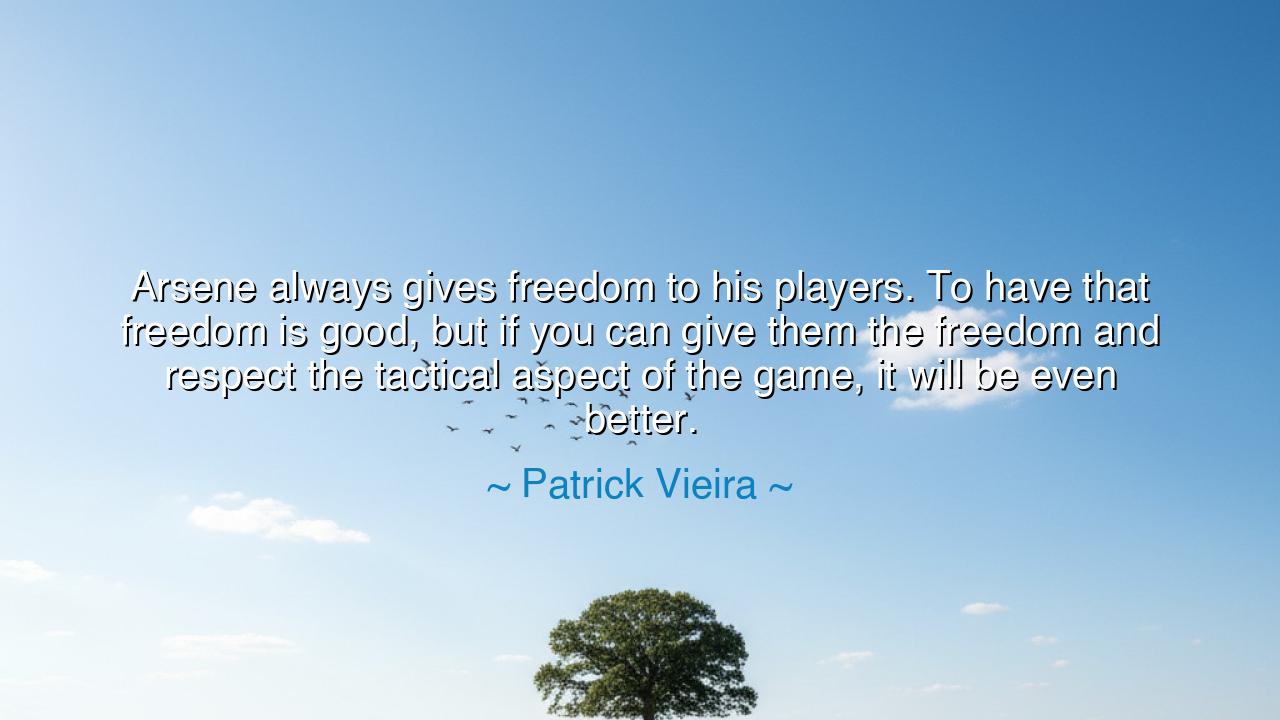
Arsene always gives freedom to his players. To have that freedom
Arsene always gives freedom to his players. To have that freedom is good, but if you can give them the freedom and respect the tactical aspect of the game, it will be even better.






In the words of Patrick Vieira, the warrior of the midfield and leader of men, we hear both reverence and reflection: “Arsène always gives freedom to his players. To have that freedom is good, but if you can give them the freedom and respect the tactical aspect of the game, it will be even better.” These are not words spoken in passing, but the distilled wisdom of a man who has lived in the furnace of battle, who has felt the pulse of both freedom and discipline on the sacred field of sport. Within them lies a truth that extends beyond the green of the pitch — into life itself.
For freedom, though it sings of beauty, can be the wild wind that scatters purpose when untamed. And tactics, though they bind, can be the structure that gives meaning to motion, the unseen rhythm that turns chaos into art. Vieira’s words speak to the eternal struggle between instinct and order, between the heart that yearns to express and the mind that must command. He speaks not only of football, but of the soul’s journey — to find balance between liberty and law, between the joy of self and the wisdom of unity.
To understand his words, one must know of Arsène Wenger, the philosopher-coach who transformed Arsenal into a temple of beautiful football. Under his gaze, players were not cogs in a machine, but artists in motion. He trusted them — he gave them freedom to express their creativity, to dance upon the field with courage and grace. But even in this paradise of play, Vieira, his captain, perceived a deeper truth: that even beauty needs bones, that even freedom must flow through the discipline of tactics. Without structure, freedom collapses into disorder; without freedom, structure decays into lifeless routine.
Consider the tale of the Invincibles, that great Arsenal team of 2003–2004. They were a symphony of contrasts — Thierry Henry’s elegance, Robert Pirès’s artistry, Vieira’s authority. Each man played with freedom, yet every movement served a greater purpose. When Henry drifted wide, it was not whim but strategy; when Vieira surged forward, it was not rebellion but harmony. They were bound by respect for the tactical aspect of the game, and that respect did not shackle their freedom — it magnified it. This is what Vieira meant: that true mastery lies not in choosing between liberty and order, but in weaving them together into one living force.
History, too, speaks of this lesson. The samurai of old Japan lived by Bushido, a code that demanded absolute discipline, yet within that discipline, they found spiritual freedom. Their every motion — the draw of the sword, the bow before battle — was choreographed, yet each movement carried the soul of the warrior. They understood what Vieira saw on the pitch: that the highest form of freedom is not to do whatever one pleases, but to act with purpose within harmony.
This is the paradox of greatness: the freer the spirit, the more it must honor the laws that give freedom shape. The painter must respect his canvas; the poet must heed the rhythm of words; the player must respect the team’s design. Without respect for structure, freedom turns to noise; without freedom of spirit, structure becomes stone. Vieira’s insight teaches us that in both sport and life, excellence is born when freedom bows to wisdom, and wisdom uplifts freedom.
So, my children of the modern age, take this lesson into your hearts: Be free — but not reckless. Be disciplined — but not rigid. Whatever your field, whether you wield a pen, a tool, or a ball, let your freedom serve a higher pattern, and let your discipline protect your flame. This is how beauty endures.
And remember this final truth: Freedom without respect is chaos, and respect without freedom is silence. The wise walk the narrow bridge between them, where art and order meet, and where human greatness — like the Invincibles of old — shines brightest.






AAdministratorAdministrator
Welcome, honored guests. Please leave a comment, we will respond soon